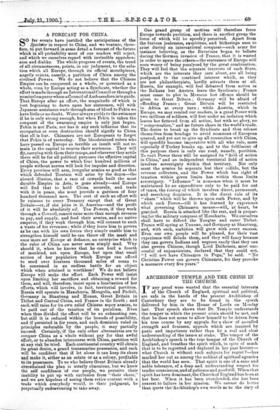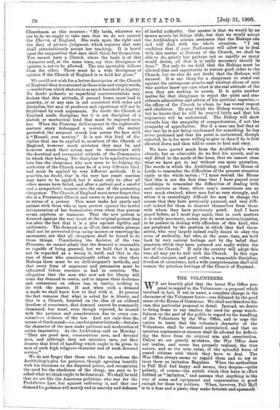ARCHBISHOP TEMPLE AND THE CRISIS IN THE CHURCH.
IF any proof were wanted that the essential interests of the Church of England, spiritual and political, are safe in the hands of the present Archbishop of Canterbury they are to be found in the epeech delivered by him in the House of Lords on Monday last. That speech shows that Dr. Temple. understands the temper in which the present crisis should be met, and that he does not mean to allow himself to be driven from his true course by any appeals for a show of so-called strength and firmness, appeals which are inspired by panic and impatience rather than by a real and clear understanding of the issues at stake. The temper of the Archbishop's speech is the true temper of the Church of England, and breathes the spirit which, in spite of much that is to be regretted and deplored in her past history— what Church is without such subjects for regret ?—has marked her out as among the noblest of spiritual agencies that the world has seen. That spirit is one of a sane and noble tolerance, of a deep and, understanding respect for tender consciences, and of patience and goodwill. When that spirit has been dominant,the Church of England has been at her best. When -it has been overclouded, she has been nearest to failure in her mission. We cannot do 1:otter than quote theArchbishop's own words as to the duty of Churchmen at this moment : "My lords, whatever we are to do we ought to take care that we do not narrow the Chu-ch of England. She rests upon the right and the duty of private judgment which requires that men shall conscientiously accept her teaching. It is based upon the supposition that men shall think for themselves. You cannot have a Church where the basis is of this character and, at the same time, say that divergence of opinion is not to be allowed. The one inevitably follows from the other. There must be a wide divergence of opinion if the Church of England is to hold her place."
We could not wish for a better description of the Church of England than is contained in these wise and simple words, —words from which rhetoric is as much banished as bigotry. No doubt pedantic or superficial controversialists may declare that this attitude, if pressed home, must lead to anarchy, or at any rate is not consistent with order and discipline, but men of prudence and experience will not be frightened by such arguments. No doubt the Church of England needs discipline, but it is not discipline of a slavish or mechanical kind that must be imposed upon her. When the Prussian drill-sergeant in the eighteenth- century story kidnapped a recruit, and the recruit protested, the sergeant struck him across the face with a "Hound, you mutiny." It is not this kind of dis- cipline that can be applied to members of the Church of England, however much mistaken they may be, and however much their action may be inconsistent with the doctrinal and ceremonial attitude of the Communion to which they belong. The discipline to be applied to bring into line the clergymen who now seem to be defying the authority of the Church must be of a very different kind, and must be applied by very different methods. It is poss;ble, no doubt, that in the very last resort coercion may have to be applied, but it must only be after all other means have failed, and after a patient and a careful and a sympathetic inquest into the case of the protesting clergyman. The Church of England must never forget that she is a Protestant Church and exists in her present form in virtue of a protest. This must make her gentle and patient with those who in turn protest against the lawful interpretation of her formularies, even when that protest seems captious or insincere. That the new protest is directed against the very heart of the original protest does not alter the fact that it is a plea against rigidity and uniformity. The demand is, in effect, that certain persons shall not be prevented from using incense or reserving the sacrament, not that all clergymen shall be forced to do those things. Considering the decision of the two Primates, we cannot admit that the demand is reasonable or capable of being granted, but we hold that it must not be regarded as a wrong in itself, and that in the case of those who conscientiously refuse to obey their Bishops there must be no drill-sergeant's methods, and that every form of argument and persuasion must be exhausted before recourse is had to coercion. The allegation that the men who now ask for liberty will some day demand to coerce, and to impose their doctrines and ceremonies on others has, in reality, nothing to do with the matter. If and when such a demand is made we shall know how to deal with it. At present the fact remains that what is asked for is liberty, and that in a Church, founded on the idea of an ordered freedom of conscience, that demand cannot be summarily dismissed, but must, even though rejected, be treated with the patience and consideration due to every con- scientious defiance of the law. And not only does the nature of the demand—i.e., one for greater latitude—but also the character of the men make patience and moderation of action imperative. As the Archbishop said on Monday : They are good men, conscientious men, and devoted men, and although they are mistaken men, yet they deserve that kind of handling which ought to be given to men of such high religious character and of such devoted service."
We do not forget that those who, like us, endorse the Archbishop's plea for patience, though agreeing heartily with his decisions on the disputed points, and recognising the need for the obedience of the clergy, are sure to be asked what we think ought to be done next. We shall be told that we are like the American politician who was for the Prohibition Law, but against enforcing it, and that our demand fcr patience will merely end in anarchy and defiance of lawful authority. Our answer is that we would by no means merely let things slide, but that we would accept the Archbishop's solemn assurance that the Bishops can and will deal with the whole situation. "I am confident that if your Parliament will allow us to deal with this matter as Bishops of the Church, we shall be able to do, quietly but perhaps not so rapidly as many would desire, all that it is really necessary should be done." Not only do we hold that the Bishops must be allowed time and opportunity to restore good order to the Church, but we also do not doubt that the Bishops will succeed. It is one thing for a clergyman to stand out against the outrageous attacks and virulent abuse of men who neither know nor care what is the real attitude of the men they are seeking to coerce. It is quite another matter for that clergyman to reject the quiet and con- siderate admonition and advice of his spiritual superior,— the officer of the Church to whom he has vowed respect and obedience. He may think the Bishop wrong in fact, but he knows that he will be treated fairly and that his arguments will be understood. The Bishop will show towards him the sympathy of comprehension, if not the sympathy of approbation. But if a man can feel that at any rate he is not being condemned for something he has never professed and that his point is understood, though rejected, he is far more willing to give in than if he is first shouted down and then told to come to heel and obey.
We have quoted much from the Archbishop's words already, but so admirable do we find his speech, and so well fitted to the needs of the hour, that we cannot close what we have got to say without one more quotation. The words in which the Archbishop urged the House of Lords to remember the difficulties of the present situation apply to the whole nation : "I must remind the House that this is not the first time that I have prayed your Lordships to remember the difficulties of dealing with such matters as these, where men's consciences are so very much strained, where men feel so very strongly, and where it is exceedingly difficult for men to change the course that they have previously pursued, and very diffi- cult indeed for them to dissever themselves from those with whom they have previously acted. And I have urged before, as I must urge again, that in such matters it is really necessary, unless you do most serious injustice, to be patient in dealing with offenders of this kind, who are perplexed by the position in which they find them- selves, who very largely indeed really desire to obey the voice of authority, but who, at the same time, are held back by very natural feelings and, by the belief that practices which they have pursued are really within the law of the Church." If only the country will adopt this tone all may yet be well with the Church. In this sign we shall conquer, and good order, a reasonable discipline, freedom of conscience, and a wide comprehension shall still remain the priceless heritage of the Church of England.



































 Previous page
Previous page